Military Lawyers: A Sense of Duty
Meet a few Wisconsin- licensed lawyers who blend civilian and
military obligations.
by Dianne Molvig
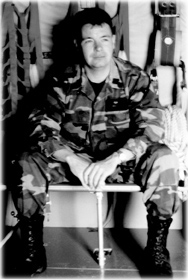
In 1999, as part of the Air Force JAG Department, Steve McManus,
Milwaukee, advised on the legality of bombing missions in Kosovo,
working from the bombers' base in England. Here, he is aboard a KC-135
refueling aircraft.
Like many people, Milwaukee attorney Steve McManus had no idea what
military lawyers do, until he became one seven years ago. In fact, when
he was a law student in the early 1990s, back in the days before "A Few
Good Men" hit the big screen and "JAG" made its television debut, "I
didn't even know the military had lawyers," he admits.
That lack of awareness persists among law students, as well as
lawyers, and now McManus is among those trying to dispel it. As a member
of the Air Force Reserve, he visits Wisconsin and Chicago law schools,
where he recruits future Air Force lawyers and tells students what it's
like to be a military lawyer. The picture he paints is as varied as the
legal profession itself.
A military legal career blends criminal law, general practice, and
in-house counsel responsibilities. A military lawyer might defend
accused murderers, prosecute misdemeanors, review business contracts,
give advice on environmental matters, handle labor disputes, draw up
wills, counsel in divorces, and more - all during just a few years of
practice and while working for the same employer.
In addition, military lawyers serve specialized functions. For
example, during military strikes in Afghanistan, lawyers are advising
commanders in selecting bombing targets and types of weaponry, to make
sure U.S. forces commit no violations of the Geneva Conventions.
Duties vary depending upon location, individual expertise, the world
situation, which branch of the armed services a military lawyer is in,
and whether he or she is pursuing a full-time military career or is a
member of the Reserve (federal) or National Guard (state). As reservists
or Guard members, many State Bar members serve the military part-time
while holding down full-time civilian jobs as lawyers and judges. Some
choose to take on nonlawyer roles for the military side of their lives.
For example, in the Wisconsin National Guard, Madison attorney Tom
Rhatican commands a helicopter unit, and Rock County circuit court judge
James Daley is an infantry commander. Many Bar members, however, opt to
use their legal expertise in both the military and civilian realms.
For some, joining the Guard or Reserve was a natural next step after
a stint of active duty. Others have never been full-timers, but have
served in the Guard or Reserve for years, even decades. What motivates
them to be involved? How do civilian lawyers juggle their private
careers with their part-time military duties? What happens if they're
called up for active duty for weeks or months at a time? We talked to
several Bar members to find out.
Ready and Waiting
Like many reservists, Louis Epps isn't sure what lies ahead. It's
anyone's guess if and when he'll be called to active duty now that the
United States is at war. But one thing is certain: Epps is eager to go.
"I've been emailing the Guard Bureau telling them, 'I'm here. I'm
healthy. Come and get me.'"
Epps has been in the Wisconsin Air National Guard for 14 years,
following four years in the Air Force Reserve and, before that, nearly
five years as a full-time Air Force attorney. He's been deployed with
his Guard unit twice: to Japan, and to southern France, where his unit
supported missions to Bosnia. Both times Epps left his public defender
job in Milwaukee for several weeks. If he's deployed during the current
conflict, he figures he'll be gone three weeks, maybe longer. "From what
I've heard recently," he says, "they seem to be going for longer
deployments."
The uncertainty can get to you, he admits. "But I feel ready now,"
Epps says, "and that relieves a lot of the stress. I know if I leave, I
won't dump on my teammates here at the office. They already have enough
on their plates."
Part of his preparation has been through his selection of cases. He's
avoided taking new long-term cases, such as homicides. And he's made
sure the status of his current cases is such that he could transfer them
to a colleague, if need be. "This is a great place to work," Epps says,
"because if you have an obligation like this, others step up and cover
for you."
Still, leaving isn't easy, he concedes. "The hardest part is worrying
about clients," he says. "You form personal relationships; you feel
responsible. Even though you know someone else is going to pick up a
case and do a good job, you don't want to leave before it's done."
For 18 years, Epps has been blending his civilian and military
obligations. His reasons for doing the latter? "I don't know how to put
this so it doesn't sound corny," he notes, "but I grew up in Milwaukee.
We were poor. I can't think of many other places in the world where I
would have had the opportunity to go to college and become a lawyer.
This state and this country have been good to me."
Landing in JAG
Steve McManus considered attending the Air Force Academy after high
school - until he hit an obstacle. "I'm color blind," he explains, "so
that prohibited me from flying. I dropped the idea altogether." Instead,
he eventually ended up in law school in Arizona. After graduating in
1993, he discovered that the military has full-time lawyers; one of his
fellow bar exam-takers had been a Marine attorney. McManus saw a route
to a military career, after all. He gained acceptance to the Air Force
JAG (Judge Advocate General's) Department in 1994.
He spent six-and-a-half years stationed in New Mexico and England,
gaining "incredible experience," he says, in multiple aspects of
practicing law. As just one example, "within my first three months, I
was trying a fully litigated court martial," McManus says. "I got trial
experience right away." In 1999, in the latter part of his active duty
tour, his job was to advise on the legality of bombing missions in
Kosovo, working at a base in England, from where the bombers flew their
missions.
Now McManus describes his experiences to law students, as part of his
recruiting duties as an Air Force reservist. In addition, like all
active reservists (as opposed to inactive members, who merely keep their
names on a roster), McManus reports for an annual two-week tour of duty
plus 12 additional days throughout the year. During this time, he
performs diverse tasks, as is typical for JAGs. For instance, he advised
security police at the base at General Mitchell Field on developing new
gate inspection procedures, and he handled a labor law case involving a
civilian employee.
Meanwhile, he's also a full-time associate at an 11-attorney
Milwaukee firm. "When I did my two weeks of duty, I was at the base
every day, 7 to 4," McManus says. "I came to my office each evening to
stay on top of things here. My firm is willing to work with me." He's
betting he won't be activated because of the Afghanistan war. If he is,
his assignment probably would be to substitute for a full-time attorney
at the Milwaukee base who gets deployed overseas.
McManus feels ready for whatever happens. That stems in part from his
days as a full-time Air Force lawyer. "In the military," he explains,
"someone is always leaving for a new assignment, and someone else comes
in. So you constantly have to be able to hand off information to the
next person. That's how I've learned to operate."
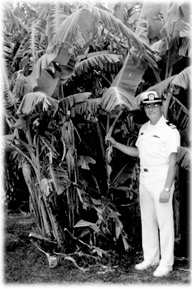
Jim Chereskin, now a sole practitioner in Florida and member of the
Naval Reserve, served much of his Navy active duty in the
Philippines.
Outside Help
Jim Chereskin's connection to the military began right after high
school. He joined the Marines because, coming from a northern Wisconsin
farm family, he needed financial help to attend college. After a tour in
Vietnam, he came back to his home state to go to college and the U.W.
Law School, from which he graduated in 1986. While a second-year law
student, he called a Navy JAG Corps recruiter one day "on a whim,"
applied, and got in. "I had a job waiting for me when I graduated,"
Chereskin says.
Then came six years of active duty, split between the Philippines and
Diego Garcia, an island in the middle of the Indian Ocean. "If somebody
had told me in law school," he says, "that someday I'd be cabled down
onto a frigate to meet a client, or that I'd be hopping in an airplane
to fly 22 hours to see a client, I would have said 'you're crazy.'"
His last duty station was an Orlando, Fla., Navy boot camp. Now,
nearly a decade after his release from active duty, Chereskin remains in
Florida, where he's a civil litigation sole practitioner and a State Bar
of Wisconsin member. He's also in the Naval Reserve, with a status
called "individual ready reserve," which involves no ongoing training
requirements. The Navy would activate him only if a large-scale
mobilization were to occur. He's in the process, however, of
transferring to active status in the Army Reserve. Should he get a call
from the latter, "I probably would be doing legal assistance for Army
personnel in central Florida who are being activated and shipped
overseas," he says.
He can't predict how long his activation might last, but for a sole
practitioner, even a few-weeks' stint would require turning over at
least some of his usual load of 50 active cases to someone else. He's
lined up two attorneys to help, if needed. What happens to his practice
if he's gone for several months? "Realistically," he says, "I'd have to
start over. It's one of those things; if it happens, it happens."
Gone in 48 Hours
It took major scrambling to cover for Barron County circuit court
judge James Eaton in 1990, when he was called to active duty as a member
of the Army Reserve. With only 48 hours to report to an Illinois base
before being shipped to Saudi Arabia, Eaton had time to do little more
than get a haircut and say goodbye to friends and family. The county and
state court administrators had to figure out a way to cover the court
docket in light of the rather sudden departure of one of the county's
two judges.
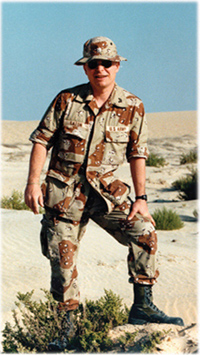
Barron County Circuit Court Judge James Eaton, as a member of the
Army Reserve JAG, was deployed to Saudi Arabia in 1990. Barron County
brought in 14 different substitute judges to handle Eaton's share of
cases while he was deployed for five months.
The remaining judge, Edward Brunner, took on the task of reviewing
all cases. To try what would have been Eaton's share of those cases,
"they had 14 different substitute judges come in while I was gone for
five months," Eaton recalls. "I remember talking to some when I got back
that I'd never met before."
Eaton's military involvement dates back to the late 1960s, when he
joined the Army ROTC while at Marquette Law School. After graduation, he
served stateside as an infantry officer and later an intelligence
officer for a few years. When he left active duty, he returned to Rice
Lake to take a job in a law firm. He also joined the Army Reserve, from
which he retired in May 2000, after nearly 30 years of service. For
about half that time, he was an intelligence officer, until he
transferred in 1984 to the Army Reserve JAG, to which he belonged when
he was deployed to Saudi Arabia.
There he was one of five lawyers attached to the 416th Engineer
Command. "We'd get in our trucks, with our computers," Eaton says, "and
go out to the units to take care of legal matters that ran from A to Z."
He also was a member of the commanding general's special staff, which
involved such duties as writing up "lessons learned" reports to help the
Army avoid repeating mistakes in the future.
Now that he's retired from the Reserve, Eaton faces no more call-ups.
No more having to use his vacation time to attend summer or
one-weekend-a-month training sessions, as he did for 30 years. Why did
he stay so long? "I loved the people," he says. "I thought I'd hate the
Army, but I loved it."
Of Time and Money
In her 15 years total with the Army Reserve and the Army National
Guard, Wautoma attorney Robyn Blader has never been called up for active
duty. But even the weekend and summer commitments - and she always does
more than the minimum required - take a bite out of her practice,
especially since hers is a two-lawyer firm. "I'd make more money if I
sat in my office and worked all weekend," she says, "and I take another
hit when I'm gone for training in the summer. But the Army gave me a
great start in life. When I graduated from high school, I didn't have
the financial means to pay for college. I feel I owe it back."
So far, Blader hasn't been called up for longer durations of duty,
which she knows would have an enormous impact on her practice. She's
done what she can to minimize the damage. She's hired an associate, who
could keep the firm running, albeit with a smaller caseload and thus a
reduced income. She'd turn many of her current cases over to her
associate, plus "I have two or three attorneys who could handle the more
complicated cases," Blader says. To keep up the business end of the
practice, she has a trusted secretary who has authority to make deposits
and write checks.
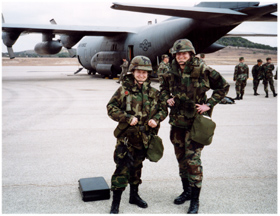
In 1999, Army National Guard member Robyn Blader, Wautoma, at left,
participated in a two-week annual training exercise for Active and
Reserve units at Fort Hood, Texas. Blader's weekend and summer Guard
commitments, and the possibility of being called up for longer duty,
have prompted her to design a strategy to minimize the impact on her
practice.
Clients are another concern. "I have to be honest and upfront with
them," Blader says. "I don't want to spring this on them. My clients
have been very understanding and supportive. No one's been scared away."
She's already prepared a letter to clients to be mailed immediately if
she's activated.
Blader figures she'll continue in the Guard for some years to come,
despite the financial drain and the extra time demands. "When you get
home late Sunday night," she says, "and you're back to work right away
Monday morning, sometimes it is tiring."
"But it's a rewarding experience for me," she adds. "Especially in
the JAG Corps, it's a very close-knit group of people. If anyone ever
needs anything, whether it's on the military or the civilian side,
everyone bends over backwards to help."
Closing Shop
Probably no Wisconsin lawyer knows better the trials and tribulations
of balancing a civilian practice and military duties than Green Bay
attorney Jim O'Neil. As a member of the Army Reserve, he spent seven
months in Iraq and Kuwait in the early 1990s. Back then, less than three
years out of law school, he was an associate with a five-attorney firm.
Then in 1996, when he was a sole practitioner in a shared-office setting
with five other solos, he was called to Bosnia for seven months. He had
to shut down his practice.
O'Neil has learned a lot from these experiences, which may help other
attorneys who face a call-up this time around. In both instances, he had
to create a network of attorneys who could handle his cases. And both
times, the network had to reach beyond the lawyers he worked for or
amidst, who "were up to their eyeballs in their own work," O'Neil
says.
Reassuring clients is equally critical. "Suddenly the small issues
become big issues when clients get notice you're going to be gone,"
O'Neil observes. Besides conveying that news by letter, O'Neil
recommends calling all clients and scheduling meetings with some.
Meeting with everybody is impossible, he notes, so set priorities. Which
cases have upcoming deadlines, court dates, or other urgent matters?
"You also have to look at each client," O'Neil advises. "Oftentimes the
clients who have been quiet and have simple, mundane cases are the ones
who suddenly get very nervous." In communicating with clients, an
attorney can suggest another lawyer but also must inform clients of
their right to go elsewhere.

Jim O'Neil, Green Bay, a major in the Army Reserve, knows first-hand
the difficulties of balancing a civilian practice and military duties.
O'Neil was activiated twice: seven months in Iraq and Kuwait; and later,
another seven months in Bosnia.
Even after an attorney leaves, O'Neil suggests keeping some support
staff on the payroll for a while, or at least making sure they're
willing to field questions at their homes or new jobs. Plus, someone,
perhaps working part-time, needs to take care of the bills, receivables,
and mail that keep flowing in.
In his activations, O'Neil had 30 to 60 days' advance notice, during
which he scrambled to tie up a myriad of loose ends, orient other
attorneys to his cases, and, before the second activation, close his
office. But professional concerns are only half the picture, he
emphasizes. "You have only so much time," he says, "and there are
competing factors. You want to spend time with your wife and children.
Your clients need reassurance, so you're scheduling meetings on evenings
and weekends. Your unit is gearing up for the call-up, so you're being
assigned additional responsibilities there. No doubt about it, it's a
stressful time."
After Bosnia, O'Neil relaunched his practice. He sent letters to
former clients, many of whom migrated back to him. But it took several
months to get his practice back to where it was. Will he be called now?
Unlikely, he thinks, but it's a question he hears often. "My
long-standing clients know I'm a major in the Army Reserve," he says.
"Almost daily somebody's calling to ask me, 'Are you going to be called
up?'"
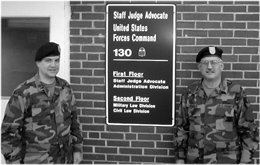
Preparing for activation is difficult – especially for small
firms and sole practitioners. These pointers can help ease the
challenge.
Preparing to Mobilize
Terence McArdle has split his 22-year law career almost evenly
between private practice and the military. A Vietnam vet when he went to
law school, he graduated in 1979. He then went to work in his father's
law firm in La Crosse and joined the Army National Guard. After his
father died, McArdle decided he needed a career change. With 10 years of
private practice behind him, he took a job as a full-time Guard attorney
at headquarters in Madison.
"I'd expected to come down here for a three-year tour," he says.
"That was 12 years ago." McArdle now holds the rank of Deputy State
Judge Advocate, reporting directly to the Guard's head lawyer. "One of
the main things we do here," he says, "is to make sure that soldiers are
ready for mobilization."
"For lawyers, the readiness steps vary depending upon type of
practice. Sole practitioners and attorneys in small firms face the
toughest challenges," McArdle says. He offers a few basic pointers on
preparing for activation:
-
Have a good tickler system. Every lawyer needs a
system to stay on top of court dates and deadlines. That's all the more
critical when you face turning over cases to other attorneys. Safeguard
against anything falling through the cracks. "Inform your clients of
those dates, too," McArdle advises, "so they know they'll have to make
sure things get done on time."
-
Enlist backup attorneys. The number you need
depends upon your practice. For instance, you might farm out family law
cases to one lawyer, probate work to another. In some communities, you
may have to look out of town to find the right attorneys. "Keep track of
who's doing what in your county bar," McArdle suggests.
-
Tell your clients. When should you tell clients
that you might be leaving? "There's no hard-and-fast rule," McArdle
says. "Have a letter ready, to be sure. But he cautions against telling
clients too much too soon and unnecessarily upsetting them - especially
in a time when people have plenty to be upset about already. "Most units
get a warning order some days before the actual orders to report for
duty," McArdle says. "When the unit gets the warning order, it informs
all its members. At that point, it would be proper to inform your
clients."
For more information on preparing for mobilization, see www.abanet.org.
Wisconsin
Lawyer
